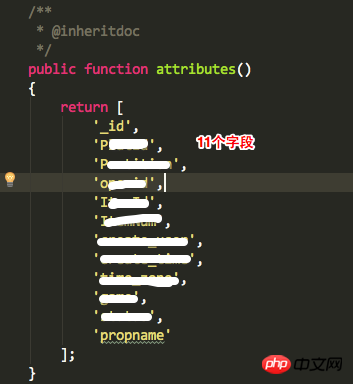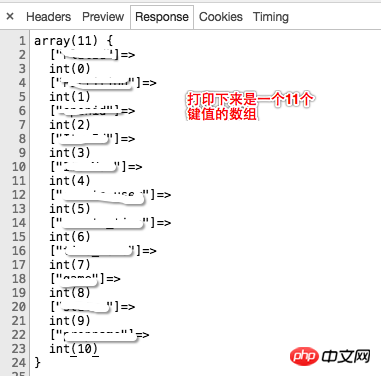Detailed explanation of load() and save() in Yii2
This article mainly introduces you to the relevant information about load() and save() in Yii 2. The article introduces it in great detail through example code. It has certain reference learning value for everyone to learn or use yii2. Friends who need it Let’s take a look with the editor below, I hope it can help everyone.
Preface
This article mainly introduces to you the related content of load() and save() in Yii2, and shares it for your reference and study. Without further ado, let’s go ahead Let’s take a look at the detailed introduction.
The database I use here is mongo and the database is chestnut:
public function load($data, $formName = null)
{
$scope = $formName === null ? $this->formName() : $formName; //调用load 一般我是 $test = new test() $test->load('参数1','参数2')
// 参数1 一般是post get 传过来的参数 第二个参数 是一个空字符串 '';
// $this->formName() 返回的额是 你实例化的类的名字 new test() 最后返回的是test
if ($scope === '' && !empty($data)) {
$this->setAttributes($data); //进入
return true;
} elseif (isset($data[$scope])) {
$this->setAttributes($data[$scope]);
return true;
} else {
return false;
}
}Let’s see next setAttributes()
public function setAttributes($values, $safeOnly = true)
{
if (is_array($values)) {
$attributes = array_flip($safeOnly ? $this->safeAttributes() : $this->attributes());
//这里执行的是$this->safeAttributes()方法,该方法返回的是当前场景下需要验证的字段。最后$attributes打印下来看下图
foreach ($values as $name => $value) {
if (isset($attributes[$name])) {
$this->$name = $value;
} elseif ($safeOnly) {
$this->onUnsafeAttribute($name, $value);
} }
}
}Figure: The file name in Figure 1 is test. After instantiation, it is the $test object public function attribues() The corresponding method is the table field.
I don’t use scenes here, so I won’t explain the scene function for now. But you can read the manual. Very easy to understand.


These two pictures are corresponding
The foreache loop is executed afterwards. $this here is the $test object. To call
//例如post 提交过来的数据是这样 $post=[ 'a'=>123456, 'b'=>'abcdef' ] $test->a=123456 $test->b='abcdef'
So this load() method only allocates the data sent by post or get, without verification.
Next, look at save();
Look at the save method.
public function save($runValidation = true, $attributeNames = null)
{
if ($this->getIsNewRecord()) { //判断是否是新纪录
return $this->insert($runValidation, $attributeNames); //执行这里 之后$this代表的是test 这个模型表。
//test 继承的是\yii\mongodb\ActiveRecord 查看insert() 方法 。
} else {
return $this->update($runValidation, $attributeNames) !== false; }
}insert() method
public function insert($runValidation = true, $attributes = null)
{
if ($runValidation && !$this->validate($attributes)) { //下面的代码分析validate方法 验证rules
return false;
}
$result = $this->insertInternal($attributes); //保存数据
return $result;
}First See
//进行数据验证。
public function validate($attributeNames = null, $clearErrors = true)
{
if ($clearErrors) {
$this->clearErrors();
}
if (!$this->beforeValidate()) { //在验证之前首先执行的是 beforValidata
return false;
}
$scenarios = $this->scenarios();
$scenario = $this->getScenario(); //检查是否调用场景
if (!isset($scenarios[$scenario])) {
throw new InvalidParamException("Unknown scenario: $scenario");
}
if ($attributeNames === null) {
$attributeNames = $this->activeAttributes(); //返回数组(值为属性的名称)
}
//$this->getActiveValidators() 验证数据。 读取rules 方法 getActiveValidators() ->getValidators()->createValidators()这里验证rules等信息->createValidator()
foreach ($this->getActiveValidators() as $validator) {
$validator->validateAttributes($this, $attributeNames); //获取交集 检查是否有错误 hasError()
}
$this->afterValidate();
return !$this->hasErrors(); }At this time, the data verification is completed, and then the data will be saved. The data saving section will not be written for the time being and will be added later.
Related recommendations:
Detailed explanation of the difference between jQuery.load() and Jsp include
Ajax application in jquery Detailed explanation of load() function examples
The difference between jQuery’s HTML() and Load()
The above is the detailed content of Detailed explanation of load() and save() in Yii2. For more information, please follow other related articles on the PHP Chinese website!

Hot AI Tools

Undresser.AI Undress
AI-powered app for creating realistic nude photos

AI Clothes Remover
Online AI tool for removing clothes from photos.

Undress AI Tool
Undress images for free

Clothoff.io
AI clothes remover

Video Face Swap
Swap faces in any video effortlessly with our completely free AI face swap tool!

Hot Article

Hot Tools

Notepad++7.3.1
Easy-to-use and free code editor

SublimeText3 Chinese version
Chinese version, very easy to use

Zend Studio 13.0.1
Powerful PHP integrated development environment

Dreamweaver CS6
Visual web development tools

SublimeText3 Mac version
God-level code editing software (SublimeText3)

Hot Topics
 1664
1664
 14
14
 1423
1423
 52
52
 1321
1321
 25
25
 1269
1269
 29
29
 1249
1249
 24
24
 PHP and Python: Comparing Two Popular Programming Languages
Apr 14, 2025 am 12:13 AM
PHP and Python: Comparing Two Popular Programming Languages
Apr 14, 2025 am 12:13 AM
PHP and Python each have their own advantages, and choose according to project requirements. 1.PHP is suitable for web development, especially for rapid development and maintenance of websites. 2. Python is suitable for data science, machine learning and artificial intelligence, with concise syntax and suitable for beginners.
 Explain secure password hashing in PHP (e.g., password_hash, password_verify). Why not use MD5 or SHA1?
Apr 17, 2025 am 12:06 AM
Explain secure password hashing in PHP (e.g., password_hash, password_verify). Why not use MD5 or SHA1?
Apr 17, 2025 am 12:06 AM
In PHP, password_hash and password_verify functions should be used to implement secure password hashing, and MD5 or SHA1 should not be used. 1) password_hash generates a hash containing salt values to enhance security. 2) Password_verify verify password and ensure security by comparing hash values. 3) MD5 and SHA1 are vulnerable and lack salt values, and are not suitable for modern password security.
 PHP in Action: Real-World Examples and Applications
Apr 14, 2025 am 12:19 AM
PHP in Action: Real-World Examples and Applications
Apr 14, 2025 am 12:19 AM
PHP is widely used in e-commerce, content management systems and API development. 1) E-commerce: used for shopping cart function and payment processing. 2) Content management system: used for dynamic content generation and user management. 3) API development: used for RESTful API development and API security. Through performance optimization and best practices, the efficiency and maintainability of PHP applications are improved.
 PHP: A Key Language for Web Development
Apr 13, 2025 am 12:08 AM
PHP: A Key Language for Web Development
Apr 13, 2025 am 12:08 AM
PHP is a scripting language widely used on the server side, especially suitable for web development. 1.PHP can embed HTML, process HTTP requests and responses, and supports a variety of databases. 2.PHP is used to generate dynamic web content, process form data, access databases, etc., with strong community support and open source resources. 3. PHP is an interpreted language, and the execution process includes lexical analysis, grammatical analysis, compilation and execution. 4.PHP can be combined with MySQL for advanced applications such as user registration systems. 5. When debugging PHP, you can use functions such as error_reporting() and var_dump(). 6. Optimize PHP code to use caching mechanisms, optimize database queries and use built-in functions. 7
 The Enduring Relevance of PHP: Is It Still Alive?
Apr 14, 2025 am 12:12 AM
The Enduring Relevance of PHP: Is It Still Alive?
Apr 14, 2025 am 12:12 AM
PHP is still dynamic and still occupies an important position in the field of modern programming. 1) PHP's simplicity and powerful community support make it widely used in web development; 2) Its flexibility and stability make it outstanding in handling web forms, database operations and file processing; 3) PHP is constantly evolving and optimizing, suitable for beginners and experienced developers.
 How does PHP type hinting work, including scalar types, return types, union types, and nullable types?
Apr 17, 2025 am 12:25 AM
How does PHP type hinting work, including scalar types, return types, union types, and nullable types?
Apr 17, 2025 am 12:25 AM
PHP type prompts to improve code quality and readability. 1) Scalar type tips: Since PHP7.0, basic data types are allowed to be specified in function parameters, such as int, float, etc. 2) Return type prompt: Ensure the consistency of the function return value type. 3) Union type prompt: Since PHP8.0, multiple types are allowed to be specified in function parameters or return values. 4) Nullable type prompt: Allows to include null values and handle functions that may return null values.
 PHP and Python: Code Examples and Comparison
Apr 15, 2025 am 12:07 AM
PHP and Python: Code Examples and Comparison
Apr 15, 2025 am 12:07 AM
PHP and Python have their own advantages and disadvantages, and the choice depends on project needs and personal preferences. 1.PHP is suitable for rapid development and maintenance of large-scale web applications. 2. Python dominates the field of data science and machine learning.
 PHP vs. Other Languages: A Comparison
Apr 13, 2025 am 12:19 AM
PHP vs. Other Languages: A Comparison
Apr 13, 2025 am 12:19 AM
PHP is suitable for web development, especially in rapid development and processing dynamic content, but is not good at data science and enterprise-level applications. Compared with Python, PHP has more advantages in web development, but is not as good as Python in the field of data science; compared with Java, PHP performs worse in enterprise-level applications, but is more flexible in web development; compared with JavaScript, PHP is more concise in back-end development, but is not as good as JavaScript in front-end development.




